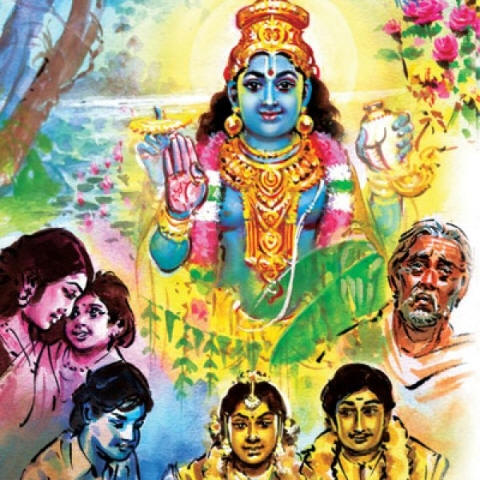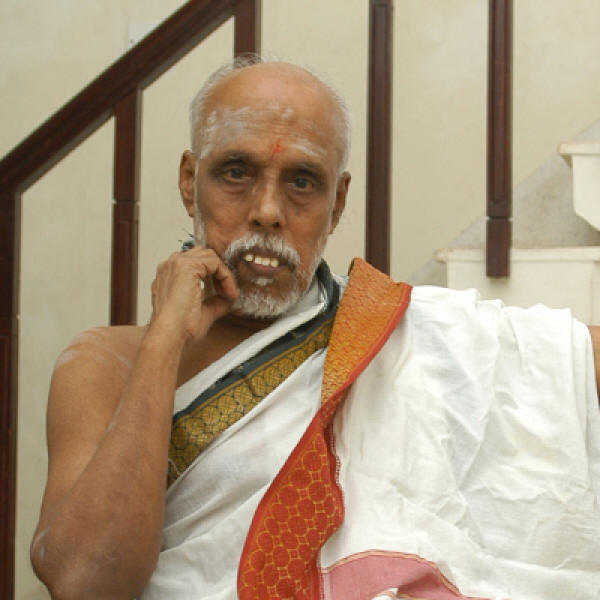Published:06 May 2019 8 PMUpdated:06 May 2019 8 PM Sakthi Vikatan
ஆதியும் அந்தமும் - 3
சேஷாத்ரிநாத சாஸ்திரிகள் Śeṣādrinātha Śāsthrigaḷ
மறை சொல்லும் மகிமைகள். ஓவியம்: மாருதி
The grandeur of Vedas. Images: Maruthi
ஆதியும் அந்தமும் - 3

1. The habit of today’s man is that he does not think of the beginning or the end. He considers as truth what he experiences in his daily life. How could that be right? It is his individualistic experience. It is wrong to say it applies to all of us.
2. Likewise, a man should neither always dwell on what happened to him, nor guess his uncertain future. Every one of us daydreams of becoming a pilot or a doctor. That is like the christening of an unborn child.
3. Everyone should strive to acquire richness of thinking so one can think for himself, think in logical ways and also think out of the box. Instead of the slavish pursuit of others, learn to live with the richness of your own thoughts and realize the goal of your birth. But, gradually, the richness of thoughts is eroding today. The power of independent thinking in others should be encouraged and enhanced. But we should not condescend to accommodate to the mental and or intellectual state of the interlocutor(s).
4. Take the office. One is an M.D. (medical doctor). Another is an executive. Yet another one is a marketing supervisor. The next one is a physical laborer. The last one depends heavily on his physical effort, not enhancing his thinking power. We should devise pathways and offer to enrich his thinking power. Instead, we offer money to him to build his own house. We should not leave him with a new home and an impoverished mind, unable to generate progressive thoughts.
5. How could a country become a superpower if the nation’s people are weak and feeble in body, mind, and soul? That majority of feeble men and women with a dearth of thinking power in their communities cannot build a nation and shine as a developed and glorious nation.
6. Birth is a divine blessing and boon. After creating mankind, he created trees, plants, vegetables, and fruits for life sustenance. These are for the public weal. The selfish few create an artificial dearth for others. This condition must change. For that, the enrichment of thinking and liberality must grow and flourish.
7. All life forms have six states in existence. Man is no exception. The thinking ability of man distinguishes him from other life forms.
8. We plant a sapling by the road. For its protection, the need for a steel net exists. Once it has grown, the need for it does not exist. A cow gives birth to a calf. The suckling needs one year of cow’s milk. Likewise, a human infant needs the parental embrace, protection, and nourishment for a specified time.
9. The consortium of parents enables embryogenesis. This is the first stage. The second stage is the birth of the baby. The third stage is education, contributing to the enrichment of his thinking power and the knowledge of the world around him. He gets clarity of thought in his mind regarding the improvement of his life and living, and his ability to protect himself and his near and dear in sticky situations.
10. Then come his wedding, his wife, and his children. His desires and needs increase. As one desire comes to fruition, another desire pops its head. With his experiences of the joys, responsibilities, and anguishes of family life, he attains mental maturity. He takes on the challenge of Vāṉaprastham (Life in the forest). His mind undergoes lysis (லயம்) in Bhagavan. In the end, he leaves his body and merges his Chaitanyam (mala-free Āṉmā) with the Universal Chaitanyam. With great ease, he leaves his body.
11. The six states in human life transformations are 1. Unseen and unknown potential for a being to exist. 2. Being comes into existence. 3. Growth Phase. 4. Body, mind, and soul undergo Change. 5. Declination 6. Perishment and return to the unseen state.
A tree also undergoes six transformations: 1) Seed, a potential form; 2) Sprout 2nd stage; it is born; 3) Sapling grows; 3rd stage and it becomes a tree; 4) Seasonal changes, flowers, fruits, later loss of leaves; 5) Tree grows old and declines; new leaves are no more. Tree withers away; Finally, the tree perishes, but not before leaving behind the seeds. Reference Krishnamachari.
12. The Vedas state that all objects in the world have six states embedded in them. This paradigm applies not only in India but also across the globe.
13. All living forms must face and undergo these six stages from potential being to the final stage. A man with enrichment of thoughts must not be like other life forms, ending in Perishment at the end.
14. All life forms are of immense use to the world. The dying flora becomes fertilizer for the next generation of plants. The dead animals are of use in other ways. Man only upon his death is of no use to anyone. The saying goes, the living elephant is worth 10,000 rupees because of its labor for man and the dead elephant is worth 10,000 rupees because of the utility offered by tusk and others.
15. All created objects have a utilitarian principle embedded in them in their beginning or the end. Man, though he had usefulness in the beginning (and the middle) had no utility in the end, meaning his dead body serves no purpose. Do you know what a man should do under these circumstances?
16. Until the last day of his existence, he must do his duties to his near and dear and the society properly and outstandingly. He should act, realizing that God created him to serve others. Before the end of the 60th birthday, he should experience the comforts of life but also facilitate others to enjoy such amenities.
More to come
Mahāmagōpāthyāya Śēṣādrinātha Śāsthrigaḷ
If you like this article, clap your hands.
-மகாமகோபாத்யாய சேஷாத்ரிநாத சாஸ்திரிகள்
இந்த கட்டுரையை விரும்பினால் எழுத்தாளருக்கு கை தட்டவும்
சேஷாத்ரிநாத சாஸ்திரிகள்
